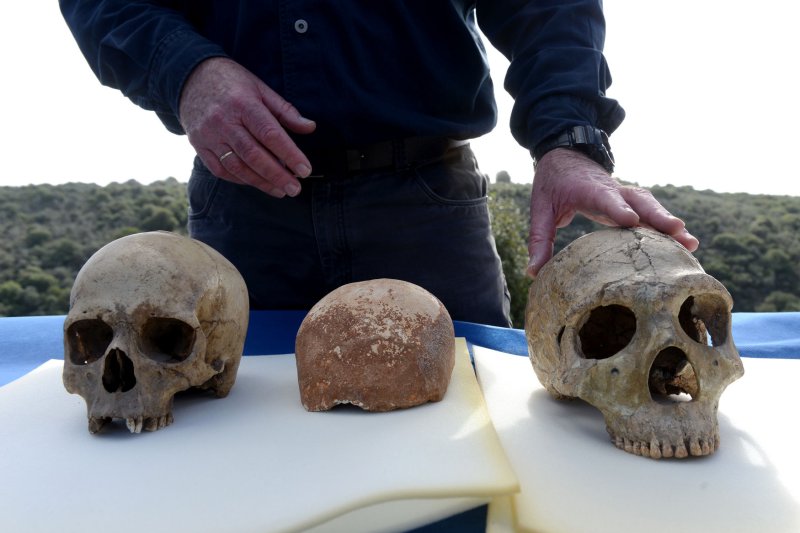1 of 5 | Professor Israel Hershkovitz of Tel Aviv University stands by a Homo sapien skull, left, a recently discovered 55,000-year-old human skull and a Neanderthal skull, right, at a press event outside the Manot Cave in the Western Galilee, Israel, on Jan. 28. A team of researchers from Tel Aviv University, Ben-Gurion University and the Israel Antiquities Authority say the 55,000-year-old skull is one of the most important discoveries in the study of human evolution. The rare skull constitutes the earliest fossilized evidence outside of Africa indicating that today's human population originated in Africa. The partial ancient skull offers clues to the first modern Europeans, as researchers suggest the population from which the skull is derived had recently migrated out of Africa and established itself in the Levantine before moving to Europe. Photo by Debbie Hill/UPI |
License Photo
TEL AVIV, Israel, Jan. 28 (UPI) -- Researchers say they've found evidence of modern man's exodus out of Africa. Scientists say a newly unearthed skull in Israel is roughly 55,000 years old. It is the earliest evidence of Homo sapiens outside of Africa, and proof that modern man set up shop in Middle East before colonizing the European continent.
"It's amazing," lead study author Israel Hershkovitz, an anthropologist at Tel Aviv University, told the Guardian. "This is the first specimen we have that connects Africa to Europe."
The fossil consists of only the top part of the skull; the face and jaw are missing. It was discovered in the Manot cave in northern Israel.
"It's the earliest evidence of anatomically modern humans outside of Africa," Omry Barzilai, one of the dig site's leaders and the head of the prehistory branch at the Israel Antiquities Authority, told Haaretz. "It supports the theory that modern humans left Africa around 60,000 years ago through this region."
The discovery confirms what archaeologists and prehistorians had long hypothesized. Now researchers have solid evidence linking fossils in Africa and Europe, validating genetic testing that showed most of modern man's DNA originated with a group of East Africans -- a group that (with the help of their offspring) went on to to colonize the globe.
Those same genetic studies also posited that Homo sapiens and Neanderthals interbred somewhere in the Middle East before groups of modern man split off and went on to settle Europe and Asia. The new skull confirms that modern and ancient man once lived side by side -- and even laid down with each other.
"Neanderthals were flourishing here 50,000 to 60,000 years ago," Hershkovitz said. "Then, anatomically modern humans arrived from Africa and created a melting pot of evolution."
The new study was published this week in the journal Nature.















